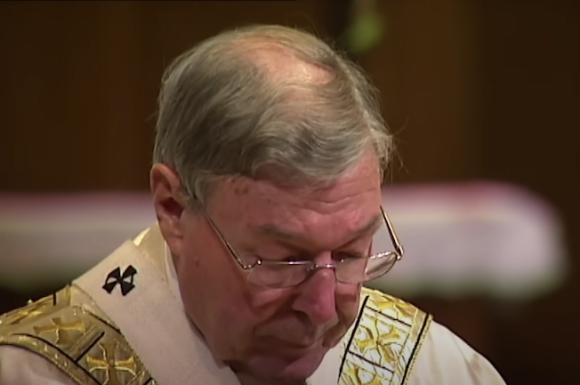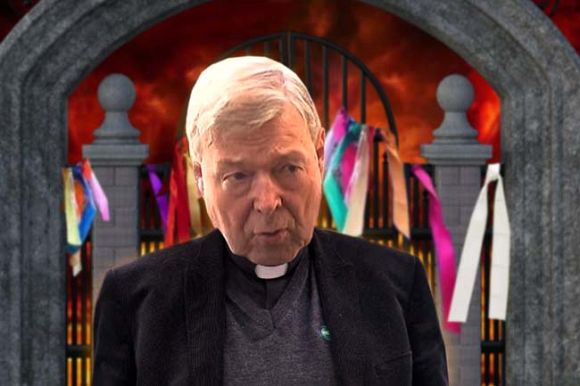After the late Cardinal and alleged sex offender George Pell was found guilty, a few voices were heard in the media in his defence.
In this article from 2019, criminal lawyer Peter Kemp explained why these people were wrong.
THERE HAS BEEN an apparent outbreak of articles and opinions saying that Cardinal Pell should not have been found guilty of sexual offences committed against two boys in December 1996.
Firstly, to clear up one misunderstanding, people who criticise that decision by the jury do not commit a contempt of court; it may well be disrespectful to the jury but it is not contempt as such. We might remember the case of Lindy Chamberlain and how the forensic disaster of the wrong reagent used for testing the presence of foetal haemoglobin (sound deadening paint gave a false positive) sent that case awry and people rightly, as it turned out, said at that time – and had the right to say – that Lindy Chamberlain could not have murdered her own baby daughter.
What is disturbing is the way some have attacked the Pell verdict, for example, Father Frank Brennan who said this in an article on 26 February 2019:
‘Should the appeal fail, I hope and pray that Cardinal Pell, heading for prison, is not the unwitting victim of a wounded nation in search of a scapegoat.’
Now, Fr Brennan has every right to hold that opinion simply as a question of free speech and it demonstrates at one level that we do have a robust criminal justice system – however imperfect – and capable of serious debate and introspection in a constant endeavour to make it more just and effective. The rights of accused and complainants are always a balancing act and there is no end to that debate. But what is the meaning of ‘unwitting victim of a wounded nation’?
It implies that the jury did not comply with the Judge’s directions and the law. In all trials across this nation, juries are warned and directed they must only consider the evidence before the court.
In Victoria, the law says:

Without the vast majority of us being present at that trial, we can be sure the learned Judge Peter Kidd gave that direction.
He would have given a direction along the lines of the NSW benchbook, for example:
It is of fundamental importance that your decision in this trial is based only upon what you hear and see in this courtroom: that is; the evidence, the addresses of counsel and what I say to you about the law. You must not, during the course of the trial, make any inquiries of your own or ask some other person to make them on your behalf. In particular you are not to use any aid, such as legal textbooks, to research any matter in connection with your role as a juror.
It is a serious criminal offence for a member of the jury to make any inquiry for the purpose of obtaining information about the accused, or any other matter relevant to the trial. It is so serious that it can be punished by imprisonment [in NSW]. This prohibition continues from the time the juror is empanelled until the juror is discharged. It includes asking a question of any person other than a fellow juror or me. It includes conducting any research using the internet.
This is, of course, logical and proper — how can the defence or the prosecution test any “evidence” found in secret by a juror as a result of a juror’s unlawful “research”? In my experience as a solicitor instructing learned counsel in scores of trials over the years, judges never fail to give that direction, or an abbreviated version of it, often repeated every afternoon just before the jury is discharged for the day. We cannot doubt for a moment Judge Kidd in Pell’s trial followed this course.
It, therefore, follows, as much as Fr Brennan (and others) may have found it painful to see the verdict, that the alleged ‘wounded nation’ narrative has cast significant doubt on that jury’s capacity to discharge their sworn duty to judge only on the evidence presented during trial. In their anonymity, they cannot respond; they are barred by law from responding to questions about their jury room deliberations. And that is unfair and perhaps Fr Brennan might consider apologising to them. That is, of course, a matter for him, a person I have great respect for.
Another critic of the verdict is Andrew Bolt, in an article in the Herald Sun (paywalled) and on Sky News, as reported upon here, where he stated:
“Pell could well be an innocent man who is being made to pay for the sins of his church and made to pay after an astonishing campaign of media vilification.”
Again, Andrew Bolt has every right to his opinion and he has every right to doubt the account of the complainant, but he wasn’t there to see that complainant give his evidence. We understand the court was closed for that both times.
Nor was Mr Bolt there to see what we understand was a vigorous cross-examination by learned counsel Robert Richter and how the complainant responded. What we can assume is that the jury was convinced by the complainant’s demeanour and responses that he was telling the truth.
That is what a jury does, it hears the evidence from witnesses, judges the evidence and decides the facts and then retreats into anonymity forever, known only by name to the Sheriff responsible for organising the jury panel.
No one else can usurp the jury’s role, only a Court of Appeal can do that.
But note the narrative is similar, there were alleged “extraneous factors” that caused the guilty verdict, but where is the evidence for this? None are advanced by Fr Brennan or Andrew Bolt, or anyone else that this writer is aware of.
What is the significance of it? I’d answer that question by going to the question of prejudice, whether a fair trial can be had. That can, for example, be addressed by way of Notice of Motion for a permanent stay on proceedings by the defence to void a trial on the basis of prejudice. That never happened, to this writer’s knowledge. The time for addressing prejudice for Pell was when the jury was chosen and the Judge advised all on the jury panel about the case and its allegations and that they could be excused if they could not bring an impartial mind to the case.
Cardinal Pell was found guilty by 12 good and true women and men. As is his right, he can appeal that conviction to a Victorian Court of Appeal.
Fr Brennan and Andrew Bolt or others do not advance the cause of criminal justice at all for anybody when they infer the jury in the Pell trial breached the law or their oaths or affirmations in the process of discharging their lawful and onerous duty.
Peter Hadden Kemp is a criminal law solicitor practising in North and North-western NSW.
 This work is licensed under a Creative Commons Attribution-NonCommercial-NoDerivs 3.0 Australia License
This work is licensed under a Creative Commons Attribution-NonCommercial-NoDerivs 3.0 Australia License
Support independent journalism Subscribe to IA.














